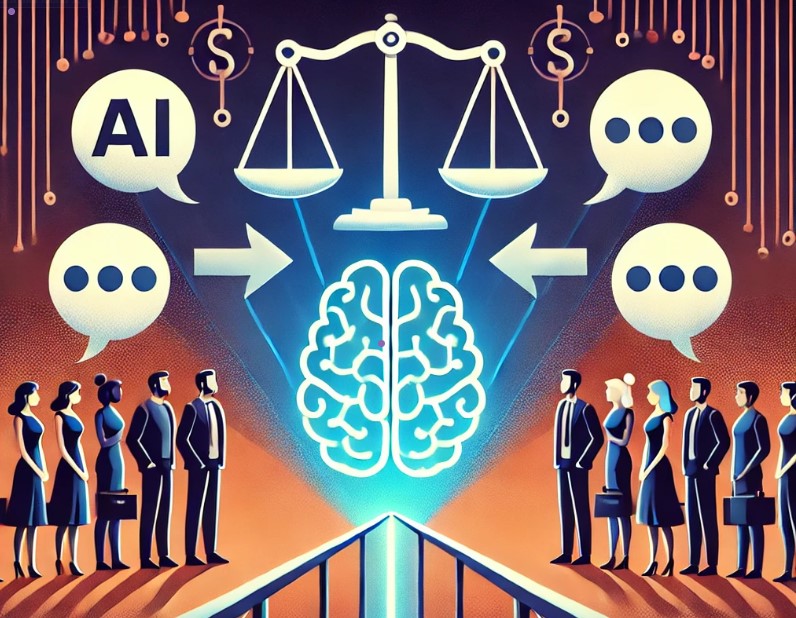While there is an ongling discussion on the danger of AI controlling humans, there has been other researches that wants to use AI to reduce human conflicts and bring peace by compromise. In recent years, the concept of using Artificial Intelligence (AI) in political and social discussions has become more prominent. A group of researchers tested whether AI could mediate contentious debates and help people find common ground. This study focused on a new system called the “Habermas Machine”—named after philosopher Jürgen Habermas, known for his theories on rational discourse and democracy. This AI system was designed to assist groups in reaching consensus during democratic deliberation on complex social and political issues.
In any democratic system, achieving consensus is often difficult. While democracies thrive on diversity of opinions, bringing together these perspectives can be daunting, especially when it comes to polarizing issues such as immigration, climate change, and national policies. Traditional methods of collective deliberation, like citizens’ assemblies, have their limitations. These assemblies bring together a small, representative group of citizens to discuss a particular issue, but they are expensive and often difficult to scale. Additionally, these sessions sometimes fail to give equal attention to all voices, especially minority perspectives.
This challenge has led researchers to explore whether AI can help overcome the limitations of human mediators and provide a scalable, more equitable platform for discussions.
What is the Habermas Machine?
The Habermas Machine is an AI system trained to generate group statements based on the opinions of individuals within a discussion. It works by collecting personal opinions from group members, then generating a collective statement that captures the shared viewpoints while respecting dissenting voices. This is done iteratively, where group members critique the initial statement, and the AI refines it to increase group approval.
The goal was to see whether the AI could mediate discussions in a fair and efficient manner. The team behind the Habermas Machine wanted to find out whether AI-generated group statements could reduce division and help participants converge on a common perspective.
To evaluate the effectiveness of the AI, the researchers conducted experiments with over 5,000 participants in the UK. These participants discussed a range of political and social issues, including divisive topics like Brexit, immigration, and the minimum wage. Each participant submitted their personal opinion, and the AI generated a statement reflecting the overall group sentiment. The AI-mediated statements were then compared with statements written by human mediators.
The results showed that participants consistently preferred the AI-generated statements. The statements produced by the Habermas Machine were rated as more clear, informative, and fair compared to those written by human mediators. This was a significant finding because it demonstrated that AI could act as a neutral, effective mediator in deliberative discussions.
How AI helps to reduces division
One of the key findings of the study was that AI-mediated deliberation led to a significant reduction in group division. After deliberation, participants’ stances tended to converge toward a common position. This was not the case when participants exchanged views directly, without AI mediation. In other words, AI helped groups find common ground in a way that traditional, unstructured discussions could not.
While support for the majority position increased after deliberation, the AI did not ignore minority viewpoints. Instead, the system incorporated critiques from minority perspectives into revised statements, ensuring that all voices were heard. This is crucial in democratic debates, where the suppression of minority opinions can lead to an unfair and skewed outcome. By balancing majority and minority perspectives, the Habermas Machine fostered a more inclusive deliberative process.
The virtual citizens’ assembly
To test the AI’s broader applicability, the researchers conducted a virtual citizens’ assembly using a demographically representative sample of UK residents. This assembly aimed to assess whether AI could support deliberation in a real-world context, outside of controlled experimental conditions.
The results were promising. The AI-mediated deliberation led to similar shifts in participants’ views on controversial issues, showing that AI could facilitate meaningful discussions in a broader societal setting. Participants in the citizens’ assembly reported feeling less divided after deliberation, and many moved closer to a common stance on key political topics.
AI in deliberation
The success of the Habermas Machine highlights several key benefits of using AI in democratic deliberation:
- Efficiency: The AI generated high-quality group statements in seconds, making it a time-efficient alternative to human mediators.
- Fairness: The AI treated all participants’ opinions equally, ensuring that both majority and minority voices were included in the final statements.
- Scalability: AI can be applied to large-scale discussions, allowing for collective deliberation among hundreds or even thousands of participants. This makes it a viable option for nationwide deliberations or large policy decisions.
- Clarity: The AI-generated statements were consistently rated as clearer and more logical than those written by human mediators. This clarity is essential in complex debates where miscommunication can lead to division.
Potential risks
Despite its advantages, the use of AI in democratic deliberation is not without risks. One concern is the potential for bias in AI-generated statements. While the study found no evidence of such bias, it remains essential to ensure that AI systems are trained on diverse, representative datasets to avoid skewing the results.
Another challenge is ensuring that participants engage in good faith. AI mediation works best when all participants are genuinely committed to finding common ground. If participants deliberately provide misleading or extreme opinions, the AI may struggle to generate a fair and accurate group statement.
Finally, while AI can facilitate discussion, it cannot replace the human element of empathy and understanding in debates. Non-verbal cues, emotional expression, and personal relationships are vital components of human interaction that AI cannot replicate. Therefore, AI should be seen as a tool to support human deliberation, not as a replacement for it.
AI in decision-making
The Habermas Machine offers a glimpse into the future of AI in democratic processes. As societies become increasingly polarized, tools like AI can help bridge divides and promote collective action. The potential applications of AI-mediated deliberation extend beyond political debates. AI could be used in various fields, including contract negotiations, conflict resolution, and legislative discussions.
However, careful implementation is necessary to ensure that AI systems are fair, transparent, and accountable. As AI continues to evolve, it will be essential to develop ethical guidelines that safeguard the integrity of democratic processes.
Conclusion
The Habermas Machine represents a significant step forward in using AI to mediate democratic deliberation. By helping groups find common ground, AI can reduce division and promote more inclusive, efficient decision-making. While challenges remain, the potential for AI to enhance democratic debate is immense. In an increasingly divided world, AI may hold the key to finding consensus on the most pressing issues of our time.
References
- Tessler, M. H., Bakker, M. A., Jarrett, D., Sheahan, H., Chadwick, M. J., Koster, R., Evans, G., Campbell-Gillingham, L., Collins, T., Parkes, D. C., Botvinick, M., & Summerfield, C. (2024, October 18). AI can help humans find common ground in democratic deliberation. Science. https://www.science.org/doi/10.1126/science.adq2852
- Williams, R. (2024, October 17). AI could help people find common ground during deliberations. MIT Technology Review. https://www.technologyreview.com/2024/10/17/1105810/ai-could-help-people-find-common-ground-during-deliberations/
- Nature Publishing Group. (2024). AI tool helps people with opposing views find common ground. Nature. https://doi.org/10.1038/d41586-024-03424-z








